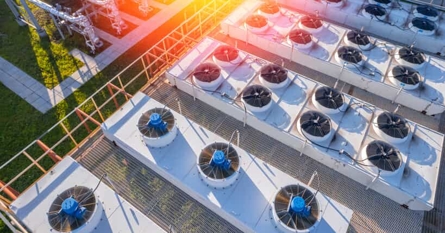Heating, ventilation, and air conditioning (HVAC) systems are vital for maintaining a comfortable indoor environment, especially in commercial buildings. However, they can also be a significant source of water damage when not properly maintained. Water leaks, condensate overflows, and other HVAC-related issues can lead to structural damage, mold growth, and costly repairs. For business owners in Manhattan, KS, understanding how to prevent HVAC-related water damage is essential for protecting their property and avoiding disruption to daily operations.
This blog provides practical maintenance tips tailored to Manhattan's unique climate, helping you identify risks and take proactive steps to safeguard your commercial building.
Understanding HVAC Water Damage
HVAC systems, by design, manage temperature and humidity, but this functionality makes them prone to water-related problems. Water damage from HVAC systems often occurs due to:
- Clogged Condensate Drains: Over time, dirt and debris can block drain lines, leading to water overflow and damage to surrounding areas.
- Frozen Evaporator Coils: Restricted airflow or low refrigerant levels can cause coils to freeze, resulting in water leaks when the ice melts.
- Leaking Ducts: Poorly sealed ducts can lead to condensation buildup, especially in humid environments.
- Faulty Drain Pans: Cracks or corrosion in the condensate pan can cause leaks.
Unaddressed, these issues can escalate into significant problems such as:
- Mold and mildew growth, compromising air quality.
- Damage to ceilings, walls, and floors.
- Increased repair costs and operational downtime.
Regular Maintenance Tips to Prevent HVAC Water Damage
Preventative maintenance is the best defense against HVAC water damage. Here are some practical tips:
- Schedule Regular Inspections
- Hire HVAC professionals to inspect your system at least twice a year.
- Look for potential issues like worn-out components, clogged drains, or refrigerant leaks.
- Clean or Replace Air Filters
- Dirty filters restrict airflow, causing evaporator coils to freeze. Replace filters every 1-3 months, depending on usage.
- Check Condensate Drain Lines
- Ensure drain lines are clear of blockages. Regularly flushing them with a mixture of water and vinegar can prevent clogs.
- Inspect and Maintain Ductwork
- Seal any gaps or cracks to prevent condensation buildup.
- Consider insulating ducts in unconditioned spaces.
- Upgrade to Smart HVAC Systems
- Modern HVAC systems with sensors can detect issues like water leaks early and alert you before they become major problems.
How Manhattan's Climate Affects HVAC Water Damage
Manhattan, KS, experiences a humid continental climate with hot summers and cold winters. These conditions can significantly impact HVAC systems, increasing the risk of water damage:
- High Humidity in Summer: The moisture-laden air strains HVAC systems, making condensate management crucial. Without proper drainage, water can back up and cause damage.
- Freezing Temperatures in Winter: Ice formation on evaporator coils or outside units can lead to leaks during defrost cycles.
- Seasonal Storms: Sudden changes in temperature or heavy rains can overwhelm systems, especially if drain lines are not maintained.
Local commercial buildings, including offices, retail spaces, and warehouses, often have flat roofs and older HVAC setups, which are particularly susceptible to water damage if not carefully managed.
Emergency Preparedness for HVAC Water Damage
Despite preventive efforts, emergencies can happen. Here’s how to prepare:
- Recognize Early Warning Signs
- Watch for water stains, musty odors, or uneven cooling.
- Investigate any unexplained increase in humidity levels.
- Develop a Response Plan
- Assign responsibilities to staff for shutting down systems and containing water in case of a leak.
- Keep a list of emergency contacts, including HVAC technicians and restoration services.
- Install Water Leak Detectors
- Place sensors near condensate pans, drain lines, and air handlers to receive immediate alerts in case of leaks.
- Conduct Regular Audits
- Inspect HVAC systems and surrounding areas for signs of wear or potential vulnerabilities.
- Work with Restoration Professionals
- Establish a relationship with a trusted restoration company like ServiceMaster Rapid Response - Manhattan for fast, efficient support when needed.
Why Choose ServiceMaster Rapid Response - Manhattan for Your HVAC Water Damage Needs
When water damage strikes, you need a reliable partner to restore your property quickly and effectively. ServiceMaster Rapid Response - Manhattan offers comprehensive solutions tailored to the unique needs of Manhattan businesses:
- Expert Assessment: Our team conducts thorough inspections to pinpoint the source of water damage and provide effective solutions.
- Water Extraction and Drying: We use advanced equipment to remove water and dry affected areas, minimizing disruption to your business.
- Mold Remediation: If water damage has led to mold growth, we ensure its complete removal and help prevent future issues.
- Preventative Maintenance Guidance: We collaborate with your team to develop strategies for minimizing HVAC-related risks.
- 24/7 Emergency Response: Water damage doesn’t wait for business hours, and neither do we.
ServiceMaster Rapid Response - Manhattan understands the specific challenges faced by businesses in Manhattan, KS. Let us help you protect your property and keep your operations running smoothly.
Protect Your Commercial Building from HVAC Water Damage
Preventing HVAC-related water damage is a critical part of maintaining a safe and functional commercial building. By implementing regular maintenance, preparing for emergencies, and partnering with experts like ServiceMaster Rapid Response - Manhattan, you can mitigate risks and avoid costly disruptions in Manhattan and the surrounding NE Kansas area.
Don’t wait until water damage affects your business. Contact ServiceMaster Rapid Response - Manhattan today for expert guidance, maintenance plans, and emergency restoration services tailored to your needs. You're property’s safety is our priority!


